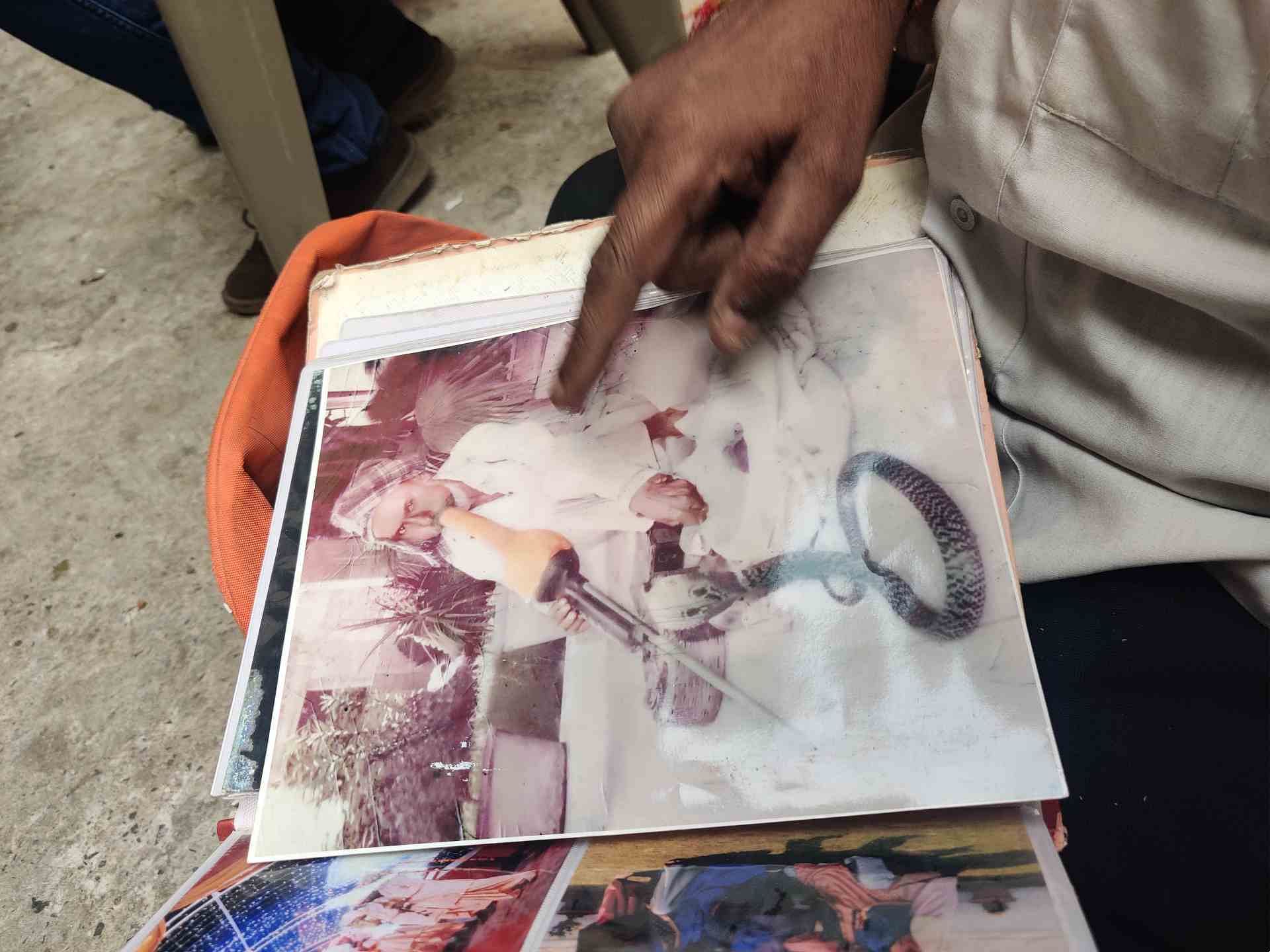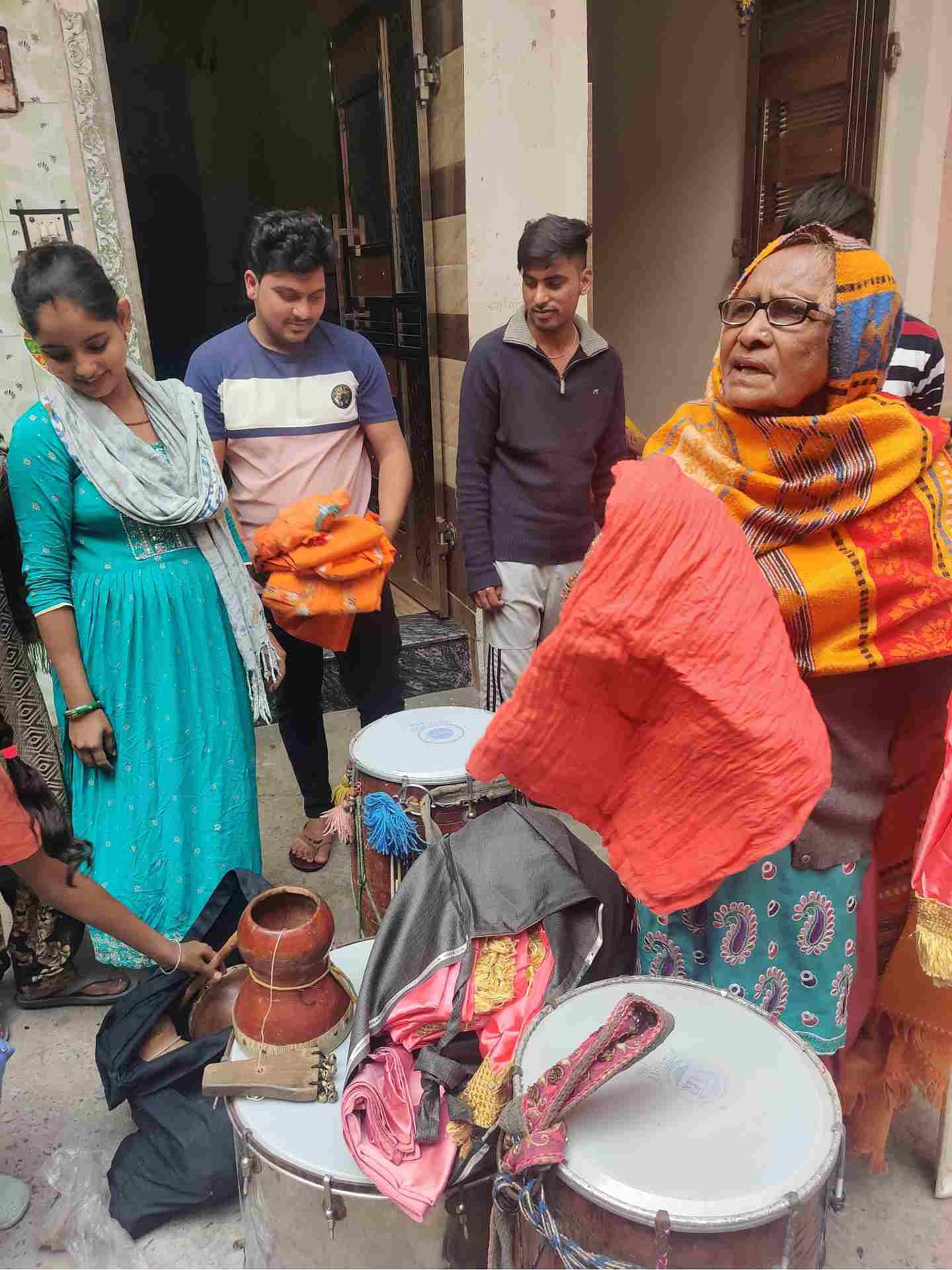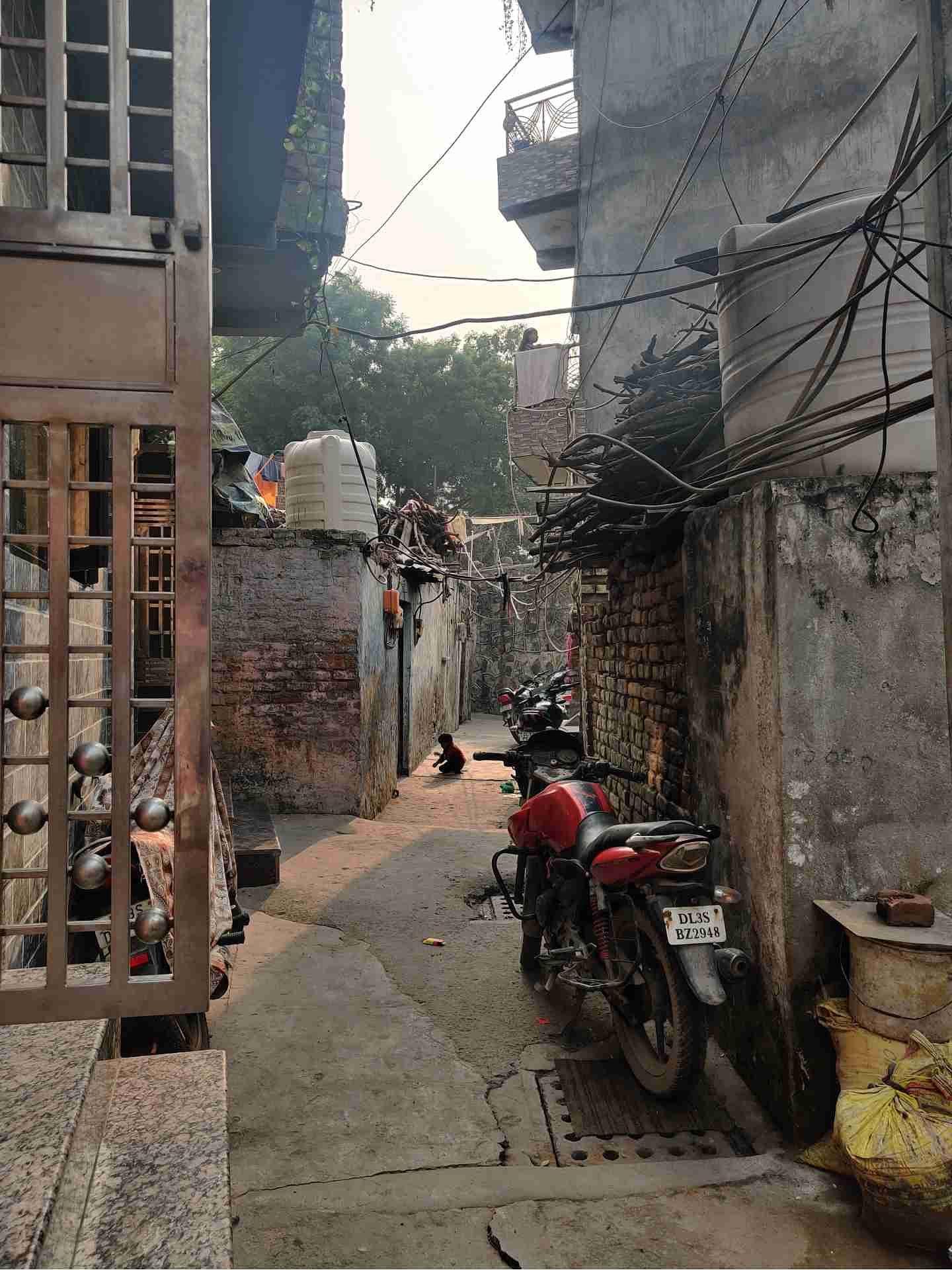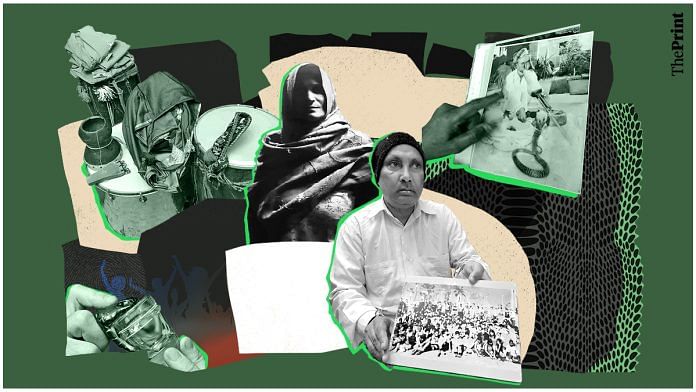Molarband/Noida: The photograph is old, but clear. A young man wearing a pagdi sits cross-legged with a been — a humongous one — held to his lips. Behind him lies a rope basket, and a cobra occupies the foreground — its head upreared, and its neck ribs stretched to form the hood some snakes use as a defence mechanism.
For Urvati, the 75-year-old matriarch of a family of snake-charmers, this photo of her late husband Naruang Nath is a source of pride.
“There is no shame in saying that we belong to this community,” she said. “We didn’t just play music and make people laugh, we helped people when they got scared on seeing a snake in their homes.”

Urvati and her family are based in Delhi’s Molarband village, a ‘Sapera basti’ that has been in focus since five residents were arrested last month for their alleged involvement in supplying snakes and snake venom — an illicit intoxicant worth crores per kg — at rave parties.
They are part of the same case that has also led police to book YouTube influencer Elvish Yadav, who has denied any involvement in the matter.
The allegations stem from an “undercover” operation organised by BJP MP Maneka Gandhi’s People for Animals (PFA), where a decoy solicited snake-charming — an illegal activity — and the venom from the five accused.
The men — Rahul, his father Jai Karan, Titu Nath, his brother Narayan, and Ravi Nath — and their families have pleaded innocence.
They point to their cramped living quarters — their poor living conditions — to question if this would be the lot of someone involved in trafficking a prized drug.
The Saperas, a denotified nomadic tribe, made a living off snake-charming until the Wildlife (Protection) Act, 1972, banned the ownership of wild animals.
Shows featuring snake-charming were formally banned in 1991, with the practice surrounded by allegations of cruelty, like the snakes being defanged, and their mouths sewn shut.
There have also been accusations of the snakes being starved so they drink milk — something reptiles don’t consume and can’t digest — offered by devotees on Nag Panchami.
Urvati bristled at allegations that the community hurt snakes in their efforts to make them pliant.
“We saved snakes, we worship snakes,” she said. “Thousands of people die each year from snake bites. So many snakes are killed because people don’t know how to deal with them,” she added. “Who is addressing all of this? Our boys are just scapegoats.”
Branded “born criminals” during British rule, who listed the community, among others, under its ‘Criminal Tribes Act’, the Saperas claim to be living a life tainted by stigma.
The ban has further pushed them against the wall, with community members saying they are struggling hard to make ends meet with alternative professions, like playing music.
While the ban has seen the number of professional snake-charmers dwindle, they are still said to be in demand, for private parties and Nag Panchami rituals.
It is the promise of one such event that allegedly lies at the heart of the case in question.
Also Read: Elvish case puts spotlight on snake venom — science behind the bite & the high that follows
Days of the past
At Molarband, home to approximately 500 people — all related to each other in one way or the other — tales of the snake-charmers’ glory days are shared with pride, including about trips around the world for performances.
“It is a talent to know how to talk to wild animals,” said Shisha Nath, 80. “It takes great skill to play the instrument we use,” he added.

Even without the snakes, their been-playing skills are high in demand, he added, flipping through a folder to show his certificates of performance at fairs by Dastkar, an NGO involved with craftspeople, and photos of performances in Spain, and one with the late Sheila Dikshit while she was Delhi chief minister (1998-2013).
He said “people still call us on Nag Panchami and other occasions like childbirth to perform”. “Moreover we are also healers,” he added.

Narayan’s son Ajay said “Titu Nath, my father and Ravi all went to Italy in 2007 to perform”.
Holding a photo album, Urvati — whose family includes Jai Karan and Rahul — showed snapshots of the father-son’s performance at the 2010 Commonwealth Games.
Rahul’s uncle Raju Nath shared photos of family members dressed in orange — their costumes embossed with the name “Jai Karan been party” — performing at different events.
Sitting beside him, Manish, his son, who works in the media industry as a transmission editor, showed a video of Rahul dancing and playing music.
The latest arrests are seen by the community as a blow to their efforts to move on. Local residents say they are caught in a crossfire between politicians, NGOs and personal rivalries, adding that invites for performances have dried up since the arrests.
“Now we have to change the whole costume because people think that whoever wears this has snakes,” said Raju. “The landlords of our shops have also asked us to vacate soon.”
The five men, now out on bail, were arrested after nine snakes, including five cobras, were allegedly found at a Noida rave party. Noida Police also claimed to have recovered “20 ml of snake venom”, but a forensic confirmation is yet awaited.
There is a purported audio recorded by the PFA that is said to have implicated Rahul.
Approached by the decoy for a snake performance, Rahul is purportedly heard saying, “The government has banned the use of snakes. We are Saperas. We can get one or two snakes. Your demand is 11 snakes. You will have to handle all the risks.”
He is heard talking about how they stopped keeping snakes because the “police make arrests when some people complain”.
“Now, we have a been party. We have to go to Rajasthan and Haryana to arrange [snakes] now… You can click photos and all,” the man in the audio further says, sealing the deal for Rs 30,000.
The investigation
Apart from the snakes and the alleged venom, Noida Police say they have recovered a diary with details about parties where the accused allegedly performed.
“These snake-charmers have said that they have been to many parties — marriages and other private functions — with snakes in several places in Haryana,” an officer privy to the investigation told ThePrint on the condition of anonymity.
“We are investigating if the snake venom is part of a larger syndicate,” the officer added, explaining that “some properties of snake venom can be manipulated to create euphoria and a state of happiness for a long period of time”.
The accused, the source said, haven’t been able to offer any explanation on the source of the “recovered venom”.
However, the families claim that the venom was planted as part of a “trap” they accuse the PFA of laying.
“Our boys have been caught up in this because of that trap laid by the PFA. None of the boys knows Elvish Yadav,” said Urvati, the first woman in the basti to attend school and currently its pradhan.
“If we were selling snake venom, would we still be living in this basti like this?” she added. “Look at the cramped lanes, look at our children. This incident has just pushed down all our efforts of climbing up the social ladder.”

Jai Karan’s brother Mahendra Nath, 65, the eldest of five brothers who retired as an officer with the Comptroller and Auditor General of India (CAG), said the incident was “orchestrated by the PFA to target the whole community”.
“We are trying hard to fight the stigma attached with snake-charmers,” he added. “We are sending our children to schools and colleges. Our children are scared of snakes. A few days ago there was a snake in the nearby lane, the children were scared but no one touched it,” he said.
Mahendra Nath alleged the PFA laid a trap to target Elvish Yadav and questioned under what powers an NGO conducted a “sting operation”.
“This is all political. On 28 October, the decoys had called another relative of ours in Tilpat village of Haryana,” he said. “Then they called Rahul on 30 October, saying it’s a birthday party and children want to see snakes.”
Nath, who said Rahul did not arrange snakes, added that he had filed multiple RTIs “on how many snakes the PFA has rescued”.
“How can anyone claim it’s snake venom without a forensic report? We had never even heard of Elvish Yadav’s name before this. These snakes and the so-called venom were planted by the PFA,” he said.
Ajay said the “NGO planted the snakes and the venom”. “We have an orchestra business. This an art but they have now even reduced that to a crime,” he added.
PFA’s Gaurav Gupta, however, said they had provided the police with all their findings on this “racket”.
“The family has been changing their statements. They can say whatever they want, but the police have CCTV footage of the banquet halls where the seizure and arrests took place and they must have found if the snakes were planted by PFA, or Rahul and his accomplices actually brought the snakes there,” Gupta told ThePrint.
“We got involved in this case after due diligence. Maneka ji wouldn’t be going public without sufficient evidence to back our findings,” he said.
ThePrint reached Maneka Gandhi by call and text but a response is awaited.
H.V. Girisha, deputy director of the Wildlife Crime Control Bureau (under the Ministry of Environment, Forest and Climate Change), told ThePrint that “as far as performance of snakes is concerned, on Googhanaomi (a festival) and Nag Panchami, every year, these tricks do take place”.
He said snake venom seizures had taken place across the country, including in Maharashtra, Rajasthan, Delhi and West Bengal. He, however, added that the production and sale of snake venom wasn’t part of an organised racket.
Also Read: Late French President Jacques Chirac saw India as a power, not a land of snake-charmers
Ban, starvation & venom
Not everyone at Molarband, however, is convinced that the snakes were planted.
Shisha Nath doesn’t doubt the police’s account about Rahul arranging the snakes, but said it must have been an act of desperation.
“He must have got lured by the money. We all struggle to make ends meet,” he said, adding that “the bigger question rests on the ban”.
“This law was passed to prevent cruelty of snakes but have people not been killing snakes? We didn’t kill them, we worship snakes and nurture them. The ban took away our livelihood, traditions, art and culture,” he added.
Shisha Nath said he saw the people of Molarband almost starve to death after the ban.
“This is when I decided to make a team of 20 snake-charmers to perform music,” he added. “We wrote multiple letters to political leaders to help us out, to find a solution to our problem but no one listened.”
Several protests have been organised since the ban, with snake-charmers seeking relaxations and the right to perform with snakes, but to no avail.
‘Born criminals’
In 1952, tribes labelled “criminal” by the British administration were denotified. They are now called the denotified nomadic tribes or DNTs.
Apart from the Saperas, these include the Banjaras, Bedias, Sansis, and Irulas.
According to a 2017 report prepared by the National Commission on Denotified, Notified and Semi-nomadic Tribes, chaired by social worker Bhiku Ramji Idate, 64 percent of DNTs are not categorised as either Scheduled Tribes (STs), Scheduled Castes (SCs) or Other Backward Classes (OBCs) , which could have helped them access education and job quotas.
DNTs can avail of state benefits through caste certificates, but this depends on the states recognising their presence in areas they inhabit.
The commission’s report says that “DNT/NT people have mentioned that due to the stigma of criminals bestowed upon them in the past, they are still treated as criminals and tortured by the local administration and police”.
The Niti Aayog and the Ministry of Social Justice and Empowerment has tasked the Anthropological Survey of India (ASI) with conducting an ethnographic survey of 269 DNTs, NTs, and SNTs in India that are yet to be included in any of the three categories. The survey report is yet to be out.
Speaking to ThePrint, B.K. Lodhi, former deputy secretary of the commission, said there was a need to provide unified upliftment policies for DNTs/NTs.
“They continue to live with the stigma of being categorised as repeat offenders and labelled ‘born criminals’. It is important that all DNTs are put together in one category for easy access to government benefits,” he added.
“Only after they come under one umbrella will they be protected like those included in the ST and SC categories. For now they don’t even have a place to report their grievances,” Lodhi said.
While the Sapera community does have reservation under SC/ST and OBC categories, it varies across states.
For instance, in Uttar Pradesh, the government recognises Saperas in three districts while a survey done by the All India Nomadic Sapera Vikas Federation, an NGO, suggests their presence in at least 20 districts.
Dr Madan Meena, director of the Gujarat-based Adivasi Academy, an institute for tribal students, said the DNT/NT population deals with multifaceted problems.
“There is no uniform classification system in the Sapera community and it has hampered their upliftment,” Meena said, adding that the stigma attached to their castes and traditional craft “often restrains them from availing of education, which reduces their job opportunities”.
Professor Vijay Raghavan, a part of the Centre of Criminology and Justice at Tata Institute of Social Sciences, who also runs TANDA — a project that reaches out to the nomadic and denotified tribes (NT-DNT) in Maharashtra — said the lack of a “rallying figure”, like Dr B.R. Ambedkar for Dalits, has not helped their cause
“Reservation is not effective to the people of these tribes because it comes into effect in higher educational institutions and children from these tribes don’t go that far,” he added.
K. Narayan, mentor at the Society for Promotion of Youth and Masses, an NGO, and formerly associated with the Union Social Justice Ministry, agreed, saying “reservation in jobs comes later, first we need to align them into the mainstream society and culture”.
“We have to implement policies and structures so that these children reach schools, and don’t drop out in Class 5. Till they don’t cross these thresholds, upliftment will be a far fetched dream,” he added.
Mohammed Tarique, the director of Koshish, a field-action project of TISS in Delhi, Maharashtra and Bihar, called for a “policy framework with legal safeguards and most importantly, empathetic acceptance of them as equal citizens”.
“Unfortunately, we have failed to do that as a society; at least not in sufficient measures,” he added.
(Edited by Sunanda Ranjan)
Also Read: These rescuers are saving humans and snakes from each other



